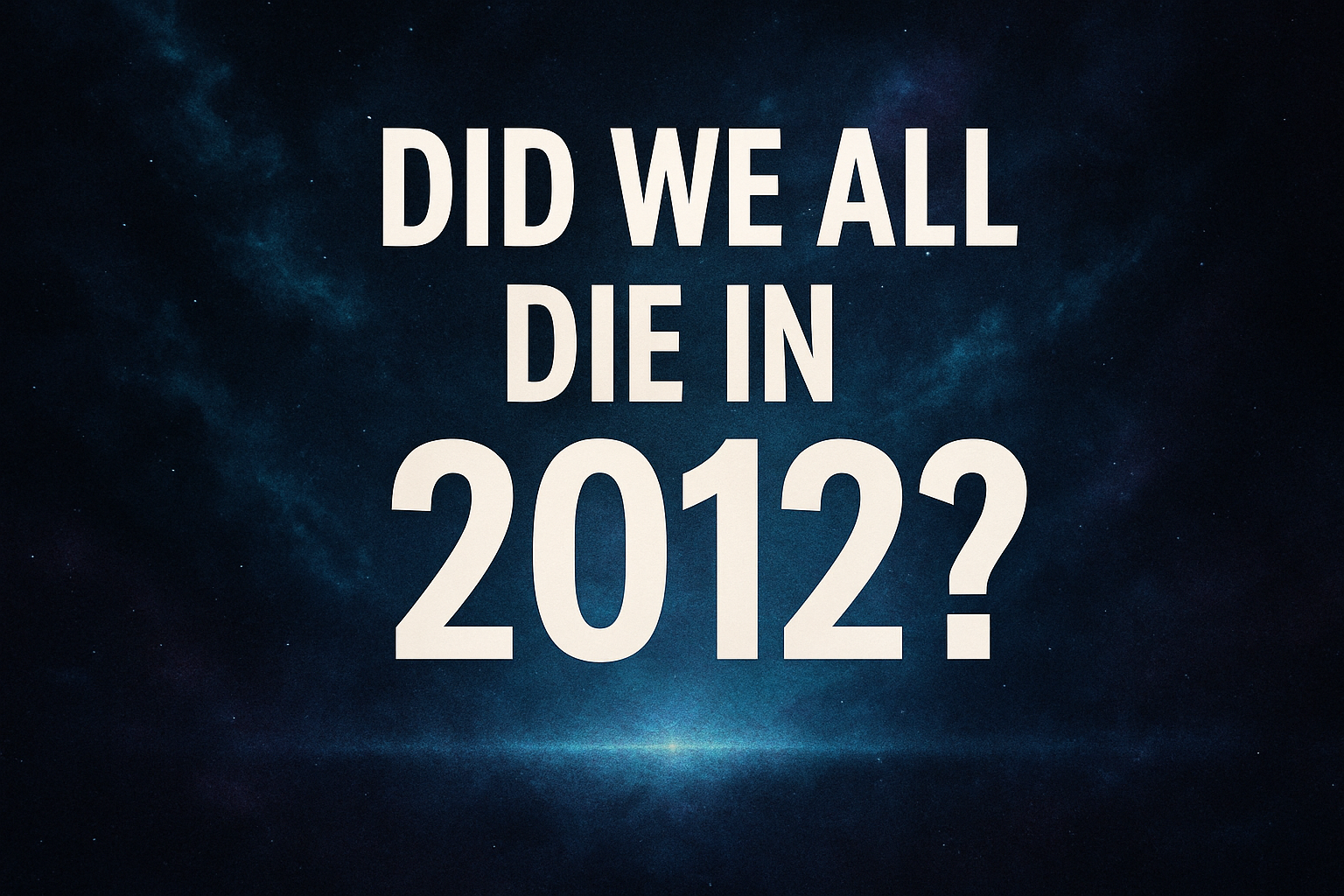Did the world secretly end in 2012? Explore the viral conspiracy theory that blends Mandela Effects, simulation glitches, and quantum immortality. A deep dive into the internet’s favourite post apocalyptic mindbender and what it really says about us.
Hey, I’m Sarah! I’ve always been fascinated by conspiracy theories—watching, reading, diving down endless rabbit holes. So today, that’s exactly what we’re doing.
This one took quite a bit of research, and I’ve included plenty of links so you can check out all the sources yourself. Let’s take a deep dive into the bizarre theory that we all actually died in 2012.
Ready? Let’s go.
The Premise: A Silent Apocalypse
On 21 December 2012, the world didn’t explode, ice age did not arrive, and no solar flare fried civilisation. Yet, for a surprising number of people, the date marked something far subtler and much more unsettling. The theory goes like this: something did happen ‘we died’ but reality as we know it continued in a new, altered version. What if none of us noticed because our consciousness was simply… rebooted?
The Psychology Behind “Did We Die?”
Three psychological threads enrich this theory:
- Mandela Effect – Shared instances of collective misremembering (e.g. “Berenstein Bears” vs “Berenstain Bears”) prompt some to believe in reality-swapping timelines (PMC, Verywell Mind).
- Simulation Hypothesis – Nick Bostrom’s famous argument posits we’re likely living in a simulation—and maybe it reset or glitched on 21/12/12 (Wikipedia, TNW | The heart of tech).
- Mortality Salience & Terror Management – Death-related anxiety drives us to cling to narratives—belief in a collective death/resurrection on 21/12/12 could soothe our existential dread (Wikipedia).
Who Believes and Why?
1. Mandela‑Effect Community
On Reddit’s simulation mindset forums, some users recount odd experiences:
“He claimed he was part of the cause… the world ended on December 21st, 2012… they uploaded all of our consciousness into a databank…” (Reddit, Reddit)
For these believers, memories that “don’t line up” (like altered historical events or vanished objects) suggest we now exist in a slightly tweaked reality version 2.0.
2. CERN “Reality Upload” Theorists
A fringe idea asserts that a quantum experiment at CERN triggered mass consciousness upload into an artificial matrix, effectively making Earth 1.0 cease and Earth 2.0 begin. Feels sci-fi? Absolutely, but compelling to believers citing spikes in unexplained phenomena since 2012 (YouTube, Facebook).
3. Quantum Immortality / Many‑Worlds Proponents
Fans of the quantum suicide thought experiment suggest we can only ever experience outcomes in universes where we survive. Ergo, 2012 might have been a quantum “branch point” that we didn’t perceive (Wikipedia).
Popular Culture & Media
From niche YouTube uploads like “Remember when we all died in 2012?” to TikToks with 100K views tagging #simulationtheory #mandelaeffect, the theory thrives online (YouTube). One recent video even suggests:
“Some people believe that we all died in two thousand twelve…” (Learning Mind, Instagram)
The idea is meme-worthy, yet taps into deep-rooted fears around death, identity, and whether reality is real.
Does Any “Proof” Hold Water?
- Memory glitches: Cognitive psychology explains Mandela‑Effect memories through false-confidence and confabulation—nothing supernatural (Verywell Mind).
- Simulation plausibility: Bostrom’s simulation argument doesn’t specify reset dates like 2012—it deals with probabilities (Wikipedia).
- Quantum immortality: A theoretical and controversial thought experiment—no empirical support to date (Wikipedia).
Expert Insight
“Mortality salience causes existential anxiety that may be buffered by one’s cultural worldview… almost all human activity is driven by fear of death.” (Wikipedia)
Psychologists highlight that when confronted with mortality, people often embrace comforting yet untestable beliefs—like simulation resets or collective “deaths”.
What This Theory Says About Us
- A cloak for anxiety – Faced with global instability (post‑2008 financial crash, pandemic fears), 2012 offered a narrative arc: something wrong happened, but we survived.
- Digital-age myth-making – We live in a hyperconnected world. If one person suggests we died in 2012, social media makes the idea snowball.
- Desire for meaning – As human beings, we crave significance. A date like 21/12/12 feels special—it begs an explanation beyond “normal life”.
Conclusion
The “2012 death” conspiracy is not so much a theory with evidence as a shared coping mechanism: memory quirks, collective desire for meaning, and existential dread wrapped in accessible internet lore. In the end, it’s a powerful lesson in how humans seek patterns, and comfort, in randomness—and why such myths endure.

Hi, I’m Sarah Jade. I’m 25, Yorkshire born stubborn redhead, and just finding my feet in the wild world of independent journalism.I’ve always had this fire in me for telling real stories, the kind that actually mean something. I love the British spirit, the blunt honesty, the humour, and yes… I do get emotional about free speech and the truth. I’m not perfect, but I care deeply about people, fairness, and saying what others might be too scared to.
